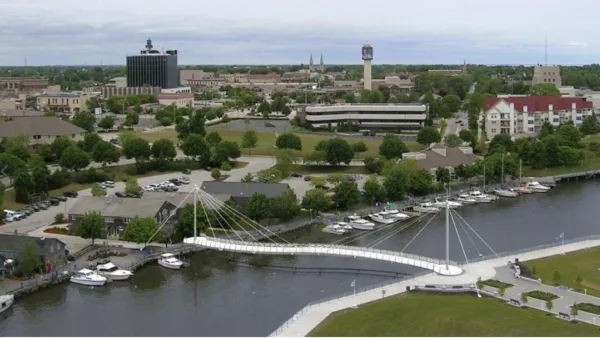The Biden administration must combine increased funding with policies that mandate and encourage transit-oriented planning.

The public transit funding included in the Biden administration's American Jobs Plan "would almost double the annual federal contribution to public transportation, which currently accounts for 17% of total transit spending," writes Simon Berrebi for Bloomberg CityLab, but increased oversight and guidance are required to maximize the effects of the spending, increase access and equity, and fight climate change. The plan, which proposes an $85 billion investment in public transit, recognizes that "to expand access to jobs, health care, schools and other destinations that keep the economy running, the key is public transportation, which provides mobility for all while minimizing congestion, pollution and energy consumption."
The new administration's infrastructure package, writes Berrebi, provides "a momentous opportunity to fully integrate transit in a new paradigm of infrastructure planning" and shift emphasis to public transit by prioritizing bus lanes, signal priority, and bike and pedestrian infrastructure as integral parts of transportation projects. "Planning for a transit-oriented future would multiply the social, environmental, and economic benefits of this historic investment."
According to Berrebi, "successful transportation and land-use policies must be planned together," and "the American Jobs Plan is an opportunity to do just that on a national scale." In addition to channeling funding to local transit systems, the administration should also ensure that housing funding is used to "build and preserve units near transit" and that new projects and initiatives "integrate public transportation deeper into the fabric of society."
FULL STORY: The Case For a Transit-First Infrastructure Plan

Planetizen Federal Action Tracker
A weekly monitor of how Trump’s orders and actions are impacting planners and planning in America.

Chicago’s Ghost Rails
Just beneath the surface of the modern city lie the remnants of its expansive early 20th-century streetcar system.

Amtrak Cutting Jobs, Funding to High-Speed Rail
The agency plans to cut 10 percent of its workforce and has confirmed it will not fund new high-speed rail projects.

Ohio Forces Data Centers to Prepay for Power
Utilities are calling on states to hold data center operators responsible for new energy demands to prevent leaving consumers on the hook for their bills.

MARTA CEO Steps Down Amid Citizenship Concerns
MARTA’s board announced Thursday that its chief, who is from Canada, is resigning due to questions about his immigration status.

Silicon Valley ‘Bike Superhighway’ Awarded $14M State Grant
A Caltrans grant brings the 10-mile Central Bikeway project connecting Santa Clara and East San Jose closer to fruition.
Urban Design for Planners 1: Software Tools
This six-course series explores essential urban design concepts using open source software and equips planners with the tools they need to participate fully in the urban design process.
Planning for Universal Design
Learn the tools for implementing Universal Design in planning regulations.
Caltrans
City of Fort Worth
Mpact (founded as Rail~Volution)
City of Camden Redevelopment Agency
City of Astoria
City of Portland
City of Laramie





























